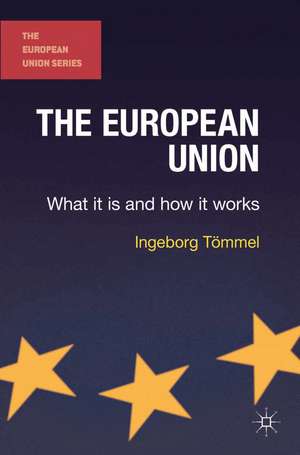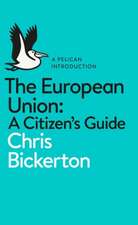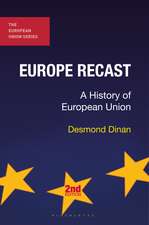The European Union: What it is and how it works: The European Union Series
Autor Ingeborg Toemmelen Limba Engleză Paperback – 21 sep 2014
| Toate formatele și edițiile | Preț | Express |
|---|---|---|
| Paperback (1) | 268.68 lei 6-8 săpt. | |
| Bloomsbury Publishing – 21 sep 2014 | 268.68 lei 6-8 săpt. | |
| Hardback (1) | 835.51 lei 6-8 săpt. | |
| Bloomsbury Publishing – 21 sep 2014 | 835.51 lei 6-8 săpt. |
Din seria The European Union Series
- 10%
 Preț: 266.43 lei
Preț: 266.43 lei - 12%
 Preț: 231.01 lei
Preț: 231.01 lei - 18%
 Preț: 256.59 lei
Preț: 256.59 lei -
 Preț: 265.76 lei
Preț: 265.76 lei - 30%
 Preț: 774.12 lei
Preț: 774.12 lei -
 Preț: 263.72 lei
Preț: 263.72 lei - 30%
 Preț: 776.58 lei
Preț: 776.58 lei - 12%
 Preț: 226.42 lei
Preț: 226.42 lei - 18%
 Preț: 257.50 lei
Preț: 257.50 lei -
 Preț: 265.47 lei
Preț: 265.47 lei - 17%
 Preț: 256.89 lei
Preț: 256.89 lei - 6%
 Preț: 239.59 lei
Preț: 239.59 lei - 14%
 Preț: 198.22 lei
Preț: 198.22 lei - 17%
 Preț: 240.98 lei
Preț: 240.98 lei - 12%
 Preț: 238.31 lei
Preț: 238.31 lei - 13%
 Preț: 232.17 lei
Preț: 232.17 lei - 13%
 Preț: 251.28 lei
Preț: 251.28 lei - 31%
 Preț: 772.74 lei
Preț: 772.74 lei -
 Preț: 258.89 lei
Preț: 258.89 lei - 18%
 Preț: 270.20 lei
Preț: 270.20 lei - 14%
 Preț: 832.17 lei
Preț: 832.17 lei -
 Preț: 265.18 lei
Preț: 265.18 lei - 18%
 Preț: 271.40 lei
Preț: 271.40 lei - 22%
 Preț: 273.24 lei
Preț: 273.24 lei -
 Preț: 271.58 lei
Preț: 271.58 lei -
 Preț: 269.94 lei
Preț: 269.94 lei - 14%
 Preț: 771.75 lei
Preț: 771.75 lei -
 Preț: 320.93 lei
Preț: 320.93 lei - 21%
 Preț: 280.55 lei
Preț: 280.55 lei -
 Preț: 263.92 lei
Preț: 263.92 lei - 18%
 Preț: 271.14 lei
Preț: 271.14 lei - 16%
 Preț: 259.19 lei
Preț: 259.19 lei -
 Preț: 270.49 lei
Preț: 270.49 lei - 18%
 Preț: 269.76 lei
Preț: 269.76 lei - 14%
 Preț: 775.19 lei
Preț: 775.19 lei - 22%
 Preț: 269.76 lei
Preț: 269.76 lei - 14%
 Preț: 270.20 lei
Preț: 270.20 lei
Preț: 268.68 lei
Nou
51.41€ • 54.98$ • 42.87£
Carte tipărită la comandă
Livrare economică 18 aprilie-02 mai
Specificații
ISBN-10: 1137427523
Pagini: 380
Ilustrații: 8 black & white tables, 1 figures
Dimensiuni: 155 x 235 x 20 mm
Greutate: 0.59 kg
Ediția:2014
Editura: Bloomsbury Publishing
Colecția Red Globe Press
Seria The European Union Series
Locul publicării:London, United Kingdom
Caracteristici
Notă biografică
Ingeborg Tömmel is Professor Emeritus of International and European Politics, Osnabrück University, Germany. She has also held positions at the Free University of Berlin, Germany and the University of Nijmegen, the Netherlands. Her research interests focus primarily on the political system of the EU and European governance, and her recent publications include the co-edited book Innovative Governance in the European Union (Rienner, 2008).
Cuprins
1. Introduction: The Political System of the EU 2. Theorizing European Integration and the Union as a Political System 3. Building the European Union: Supranational Dynamics and Intergovernmental Configurations 4. Consolidating the European Union: Enlargement, Deepening Integration and Crisis Management 5. The Core Institutional Structure 6. Decision-Making: Cooperation and Conflict among the Core Institutions 7. Decision-Making and Consensus-Building within the Core Institutions 8. Expanding and Diversifying the Core Institutional Structure 9. Promoting Integration: Policy-making and Governance 10. Building a Multi-Level System 11. Building a Multi-Actor System 12. Assessing the European Union: Efficiency and Effectiveness 13. The Democratic Legitimacy of the EU 14. Conclusions: The Nature of the European Union.
Descriere
The European Union affects the lives of Europeans in many and varied ways, yet, in spite of its reach, it often appears a constrained political system - struggling for internal consensus, reliant on the agreement of national governments, and hampered by the scepticism of electorates. These issues have become even more acute in the wake of the global economic and eurozone crises. This new text provides a concise and up-to-date introduction to the nature of the European Union, giving an account of its evolution and structure that makes sense of its current challenges. The text analyses the EU's institutional structure and decision-making procedures, and highlights the manifold conflicts as well as the sophisticated mechanisms for consensus-building among the core institutions. It explains the ways in which the EU differs from other forms of political order, and how this leads to political processes that are characterized by cooperation and conflict. In providing this context, the author invites readers to a critical assessment of the functioning of the European Union, and of the implications of this for its democratic legitimacy and future prospects.









